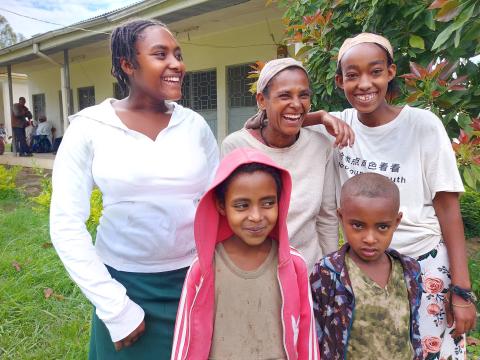Building healthcare and training birthmothers leading to rapid paradigm shifts in child wellbeing

Seventeen years ago, home birth was widely practised in Qedida Gamela district, Jore village, 297.5 miles (357 kilometres) south of Addis Ababa, Ethiopia. Pregnant women delivered at the hands of Traditional Birth Attendants (TBA). The practice, however, has had harmful effects, from severe health complications to deaths.
Tigist, 40, was one of the mothers who had suffered the consequences of giving birth at the hands of TBA. She had a horrific experience with each of her first four deliveries. "My first labour was a two-day ordeal with heavy bleeding. It cost me my firstborn," she recalls, tears streaming down her cheeks. "Had I known the possibility of giving birth at a health centre, I would not have lost my baby," she reflected regretfully. Going through labour while giving birth to her three children was something she would never wish for anyone.
She recalls her labour experience with the Traditional Birth Attendants, She says, "They had no idea when I was due, so she rubbed my belly for a long time. I bled so much and had a near-death experience. That was a terrifying moment. After giving birth, I became so feeble that it took me several days to recuperate."
In 2008 to address the rampant maternal cases, World Vision constructed a health post in Tigist’s village to improve the situation. It trained health staff on safe delivery and provided the health post with adequate health facilities. Cognisant of the advantage, Tigist delivered her three children at the new health post. "The establishment of the community health post in my village provided me with a very good opportunity. During pregnancy cheque-ups, I followed all the necessary steps that eased the delivery process. My children and I are healthy because of the support and consultations the midwives gave me,’’ she recounts.
In terms of health, Tigist observes visible differences in her children. One of her daughters, whom she delivered unassisted, was repeatedly sick, stunted, weak and could not register for school by the state-mandated age. World Vision's support changed the course. Tigist's youngest daughter, who was born in a birthing centre, is healthy and started school at an early age. Furthermore, her three kids got vaccinated.
Mrs. Abebech, Health Extension Officer, agreed with the comparison, saying, ‘‘Physical growth usually refers to changes in size or mass, so it is correct to say that a child grows in stature (height) or body weight. The first 1000 days are critical to a child's development. During this time, both mother and child should get nutritious foods and be immunised. If not, they'd have a health problem, and their physical growth would experience stunted growth."
World Vision Durame Area Development Programme, after supplying the health post with medical equipment, trained birthmothers and health personnel on maternal and child health, created awareness on immunisation, and a paradigm shift has been taking place. Mothers' frames of mind on pregnancy, delivery preferences, and immunisations changed.
Tigist summed up World Vision's grand works in a few lines: The health post saved her three children and many others from the consequences of homebirth and its domino effects on families and the community at large. "I thank World Vision for all the good deeds,’’ she concludes.
By Hilina Hailu, Communications Coordinator, World Vision Ethiopia